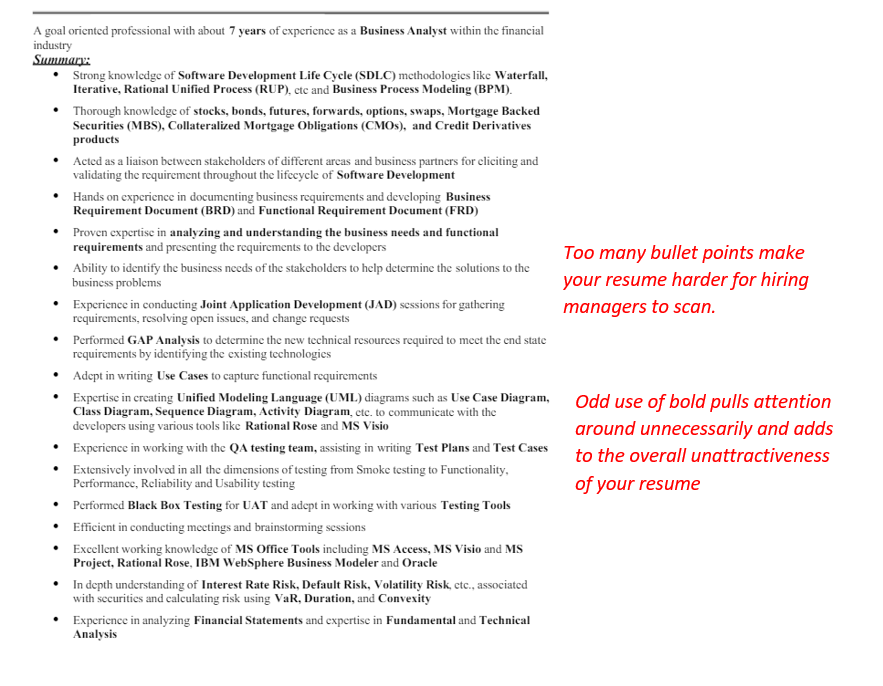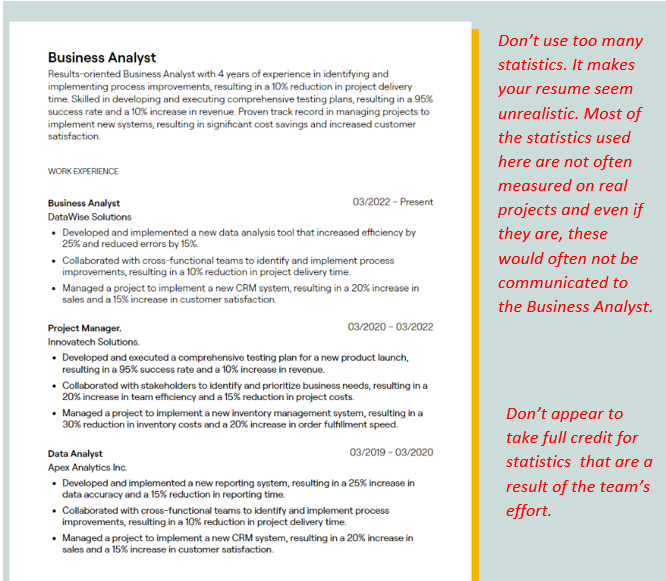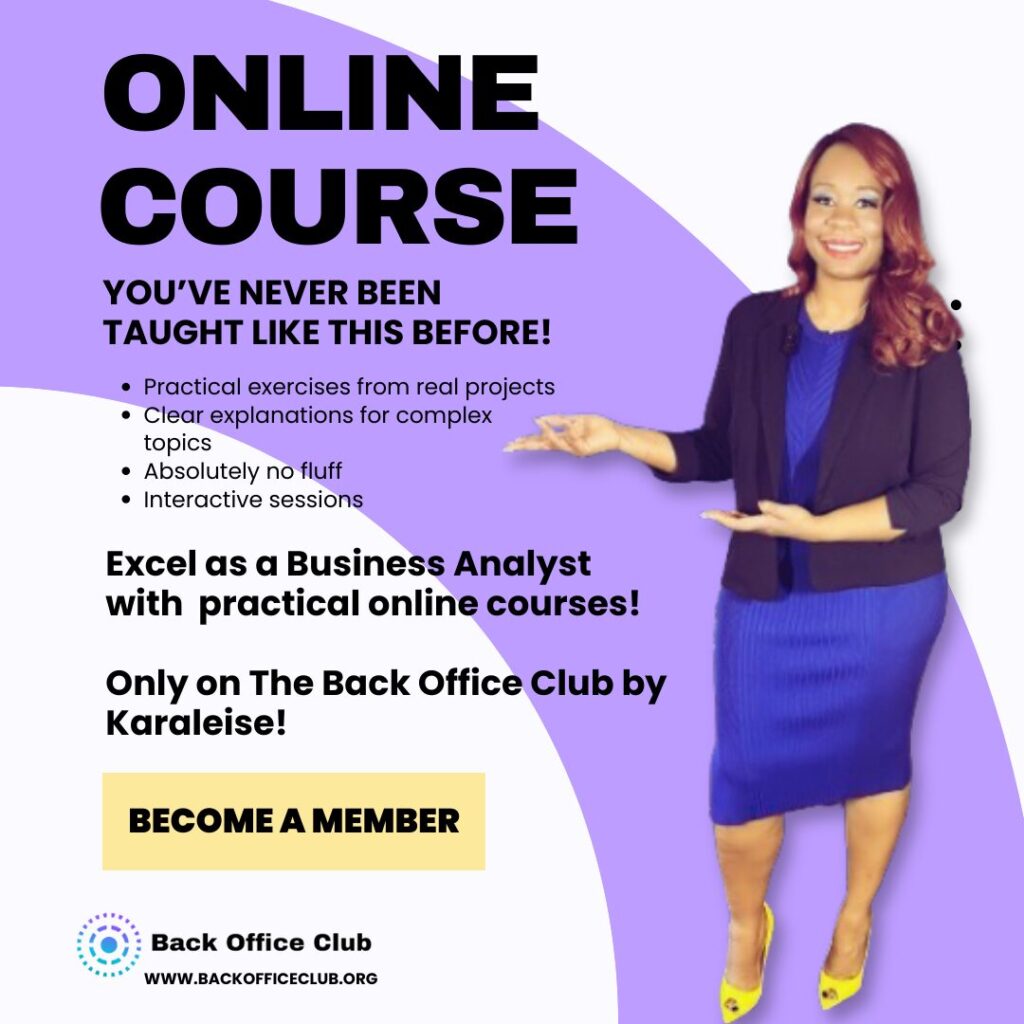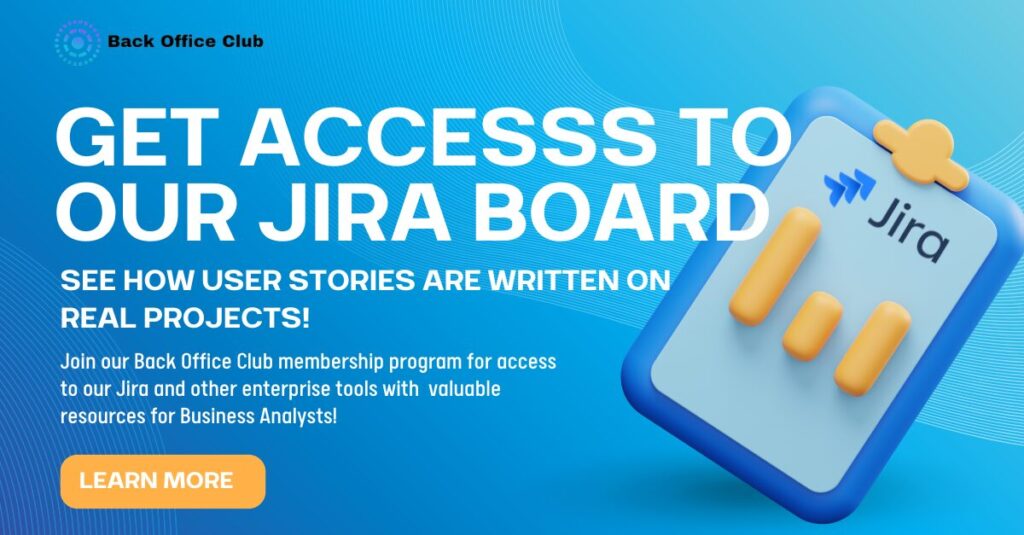Unleashing Success: Crafting the Perfect Business Analyst Resume
In the competitive realm of job hunting, your Business Analyst resume stands as your digital handshake with potential employers. To ensure it captivates at first glance, follow this comprehensive guide to crafting your Business Analyst resume to optimize your job hunt success.
What makes a good Business Analyst resume?
- Good layout and formatting -your resume must reflect your documentation skills as a bsiness analyst
- Make your name the largest text on the resume
- Make your contact details easy to find
- Add a concise professional summary – introduce yourself in one paragraph or less.
- Do not use creative section headings – this makes it difficult for application tracking systems to parse.
- Make your resume scanable – add bullet points and spacing to help with readability
- Make each job have no more than 8 bullets and each bullet no more than 2 lines
- Showcase your individual contribution – don’t take credit for the entire team’s work
- Understand your Business Analyst role – it becomes unbelievable if you claim to perform all the roles on a project.
- Use Business Analyst keywords – use appropriate Business Analyst terminologies throughout your resume
Understanding the Basics
1. Crafting a Compelling Summary
Your resume’s opening statement is the gateway to success. Craft a concise and impactful summary, highlighting your key strengths and accomplishments. This section is your chance to grab attention, so make it count!

In your professional summary, be sure to capture your reader’s attention with personal information that they won’t find elsewhere in the resume.
For example, read the professional summary from a Business Analyst resume b below:
 Highly accomplished and results driven senior Business Analyst professional offering more than 10 years professional experience within the healthcare industry, combined with proven history of success in driving hospital operations, digital transformations, process optimization, service quality improvements and continous development of staff.
Highly accomplished and results driven senior Business Analyst professional offering more than 10 years professional experience within the healthcare industry, combined with proven history of success in driving hospital operations, digital transformations, process optimization, service quality improvements and continous development of staff.
This professional summary above boxes you into the healthcare industry – unless you want to only attract healthcare related jobs, then you should avoid focusing on the industry in the first paragraph of your resume. Your Business Analyst skills can apply anywhere in any industry so its not necessary to name an industry here.
Also the reader will see your years of experience and seniority level later in the resume. Use this summary to appeal to the reader at a more personal level – highight what value you will to them.
Here is a better way to say reword this professional summary
![]() Highly accomplished Business Analyst professional with extensive experience solving complex business problems in operations, digital transformations, process optimization, service quality improvements and continuos development of staff. I will facilitate better communication between the business and the technical teams, I will provide detailed documentation and I will think outside the box to recommend solutions that help your organization deliver projects successfully.
Highly accomplished Business Analyst professional with extensive experience solving complex business problems in operations, digital transformations, process optimization, service quality improvements and continuos development of staff. I will facilitate better communication between the business and the technical teams, I will provide detailed documentation and I will think outside the box to recommend solutions that help your organization deliver projects successfully.
With this professional summary you pitch yourself as providing the answer that companies are looking for in a Business Analyst. By using “I” statements, you single yourself out as the person that will solve the problem that the hiring manager is looking to solve by hiring a Business Analyst.

2. Mastering the Art of Keywords
Incorporate industry-relevant keywords strategically throughout your resume. This not only boosts your visibility in applicant tracking systems but also showcases your familiarity with the industry’s language.
Important keyword for the Business Analyst role include: business requirements document, user stories, requirements elicitation, sql queries, Waterfall methodology, agile methodology, process improvement among others.
Showcasing Your Professional Journey
3. Experience Matters: Work History Showcase
Delve into your professional experience with a focus on achievements. Use bullet points to outline your responsibilities, emphasizing tangible results and quantifiable accomplishments. This not only provides clarity but also adds a punch to your resume.
Be careful not to over inflate here. As a Business Analyst its not always easy to quantify your individual contribution.
For example:
 “Boosted website traffic by 20% leading to more technical demos and sales”
“Boosted website traffic by 20% leading to more technical demos and sales”
This statement shows you taking credit for the entire teams work that lead to the boost in website traffic
Instead you can say:
 Documented the requirements for the website revamp project and provided support during development, this boosted website traffic by 20% leading to more technical demos and sales“
Documented the requirements for the website revamp project and provided support during development, this boosted website traffic by 20% leading to more technical demos and sales“
This statement shows how you individually contributed to the final outcome and highlights your Business Analyst role in the process, which is more believable and effective.

4. Educational Excellence
Highlight your educational background with a dedicated section. Mention your degrees, certifications, and any relevant courses that enhance your qualifications. This adds credibility to your profile.
You can also mention membership to Business Analyst organizations such as the IIBA
Skills that Make You Stand Out
5. Technical Proficiency
Create a distinct section for your technical skills. Business Analysts often require a mix of technical expertise and soft skills. Clearly list tools, software, and methodologies you’re proficient in, showcasing your versatility.
6. Emphasizing Soft Skills
Beyond technical prowess, highlight your soft skills such as communication, problem-solving, and teamwork. Employers value a well-rounded professional who can navigate both technical and interpersonal challenges.
Building Credibility with Achievements
7. Achievements that Speak Louder than Words
Dedicate a section to your notable achievements. Whether it’s streamlining processes, improving efficiency, or contributing to successful projects, showcasing your impact reinforces your value to potential employers.
The Final Touch: Polishing Your Resume
8. Proofreading Perfection
Before sending your resume into the professional arena, proofread meticulously. Tools like Grammarly can be invaluable in catching any overlooked errors and ensuring a polished final product.
Unlocking Your Potential
Crafting a Business Analyst resume is an art that demands attention to detail and strategic finesse. By incorporating these tips, you not only enhance your resume’s visibility but also position yourself as the ideal candidate for the job. Remember, in the world of business analysis, precision and clarity are your greatest assets.





 “
“







